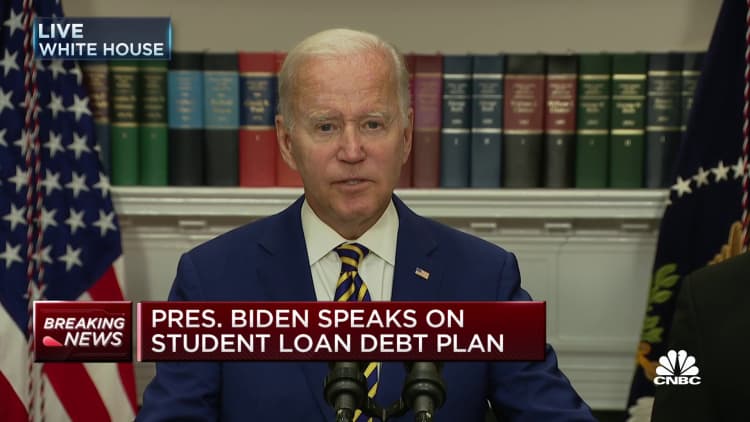[ad_1]
Phynart Studio | Istock | Getty Images
President Joe Biden’s announcement last month that he’ll forgive up to $20,000 in student debt for borrowers will also impact the millions of parents who have taken out loans for their children’s education.
The debt cancellation applies to so-called Parent PLUS loans, federal loans that parents can take out to help their dependent children cover their college costs.
With tuition costs spiking over the last few decades, more students are hitting the limits on what they can borrow in student loans, pushing parents to borrow more.
More from Personal Finance:
How student loan forgiveness will be applied to your debts
Key events on the path to student loan forgiveness
How to calculate your bill for student loan forgiveness
Currently, more than 600,000 parents take out student loans for their children each year, up from around 450,000 in 2000, according to data provided by higher-education expert Mark Kantrowitz. The average outstanding Parent PLUS loan is about $30,000, he said.
Many of these parents will now get some relief.
“Both students and parents should apply for forgiveness,” Kantrowitz said.
Here’s what to know.
1. Do I qualify?
President Joe Biden announced in August that most federal student loan borrowers will be eligible for some forgiveness: up to $10,000 if they didn’t receive a Pell Grant, which is a type of aid available to low-income undergraduate students, and up to $20,000 if they did.
Separate from whatever relief their children may be eligible for, parents with Direct PLUS loans will be entitled to loan cancellation, too, as long as they fall under the income caps set by the president: $125,000 for individuals or $250,000 for households. If you made under these amounts in either 2020 or 2021, you ought to be good.
In some cases, both parents applied for Parent PLUS loans for their children and they’ll both individually be eligible for loan cancellation.

If a parent in their own undergraduate years received a Pell Grant, they’ll be able to get the $20,000 in loan forgiveness, whether or not their child had the grant in their financial aid package. Likewise, if the parent didn’t get a Pell Grant, but their child did, the parent can qualify for only $10,000 in cancellation themselves.
You can check your account on Studentaid.gov, under the “My Aid” section to see if you got the grant. Most recipients come from families with incomes of less than $60,000, Kantrowitz said.
2. What if I have Parent PLUS loans and my own student loans?
The forgiveness amounts announced by Biden, either $10,000 or $20,000, are per borrower. That means that will be the limit to your relief, across any different types of federal student loans you hold. It’ll also be the limit regardless of how many children you borrowed for.
Although your Parent PLUS loans may get forgiven over your own student loans, since the U.S. Department of Education is prioritizing loans with higher interest rates.
Currently, Parent PLUS loans come with an interest rate near 8%, compared with under 5% for undergraduate student loans.
3. Should I apply for forgiveness with my child?
No.
“Parents should apply separately from their children,” Kantrowitz said, as you’re both eligible for your own relief.
The Education Department has said an application will be ready by “early October.” Ideally, you’ll be ready to request relief as soon as the application launches.
4. What if I still have a Parent PLUS balance after forgiveness?
If you’re still in debt after student loan forgiveness, you’ll want to be prepared for the bills to resume in January.
That’s when the pandemic-era relief policy suspending federal student loan payments and interest is scheduled to end.
You may consider refinancing your remaining balance to pick up a lower interest rate, Kantrowitz said.
However, although doing so can save you money, there are a number of reasons consumer advocates say to proceed with caution when thinking about flipping your federal student loans into private debt.
Your rate doesn’t matter if you lose your job, have sudden medical expenses, can’t afford your payments and find that defaulting is your only option.
Betsy Mayotte
president of The Institute of Student Loan Advisors
The Education Department allows some borrowers to make reduced monthly payments if their income is low and others can postpone their bills without interest accruing if they prove economic hardship. The government also offers loan forgiveness programs for teachers and public servants.
Private lenders typically only allow for limited breaks from your payments, during which interest builds.
As a result, Betsy Mayotte, president of The Institute of Student Loan Advisors, said she can count on one hand the number of borrowers for whom she’s thought refinancing their federal loans into private ones was a good idea.
“Private student loan refinancing can generate a lower interest rate than federal student loan rates,” Mayotte said, “but your rate doesn’t matter if you lose your job, have sudden medical expenses, can’t afford your payments and find that defaulting is your only option.”
[ad_2]
